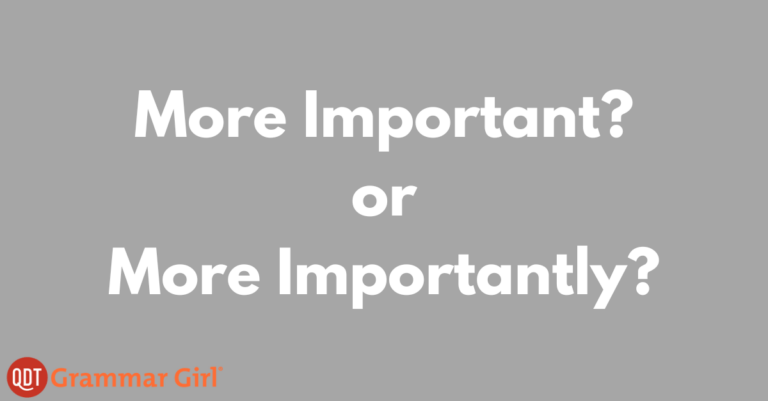You may occasionally hear or read an objection to the phrase “more importantly.” You can ignore it (unless you are writing a cover letter or some other document where you’ll be judged without the chance to defend yourself).
“More important” and “more importantly” are both grammatically acceptable and have been in use for decades. It’s unclear which one came first. A Google Ngram search, which shows how often words are used in published books that have been scanned by Google, shows “more important” as much older and more popular, but the Merriam-Webster Dictionary of English Usage says “more importantly” is older and Garner’s Modern English Usage says “more importantly” is fully standard and at least as popular as “more important.”
The Oxford English Dictionary Supplement calls “more important” “a kind of sentence adjective” and “more importantly” “a kind of sentence adverb.” When they say “more importantly” is a kind of sentence adverb, they mean it’s like “thankfully” and “fortunately” when they come at the beginning of a sentence. They aren’t modifying a specific word in the sentence, but rather the entire sentence.
If you write, “Thankfully, we didn’t run out of guacamole,” you’re thankful for the entire sentiment of the rest of the sentence.
And if you write, “More importantly, the neighbors didn’t call the police because of our loud music,” again, you think all the rest of the sentence is what is important. It’s not just important that the neighbors didn’t call or that it wasn’t the police that the neighbors called; it’s the whole thing—that the neighbors didn’t call the police because of the loud music—that’s what’s important.
“Thankfully” and “importantly”: sentence adverbs!
The only difference between “important” and “importantly” is that you can’t use “important” alone. You have to use “more” or “most” when you use “important” at the beginning of a sentence like that, but you can use “importantly” alone.
“Important, the neighbors didn’t call the police” doesn’t work, but “Importantly, the neighbors didn’t call the police” does work.
And that’s your Quick and Dirty Tip. You can start a sentence with either “more important” or “more importantly.” Both are fine, but when you want to get rid of the word “more” (or the word “most”), you have to use “importantly.”




